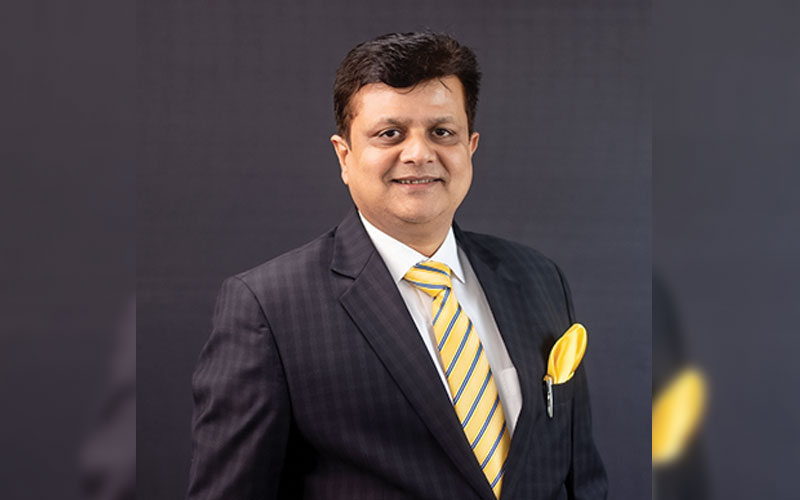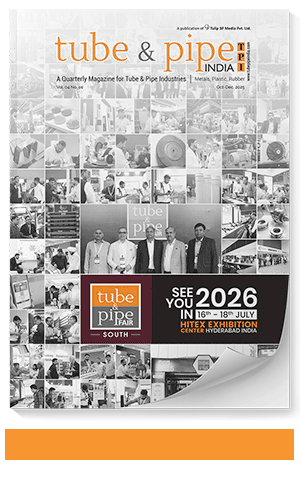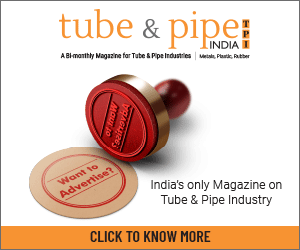Dadu Pipes, equipped with five tube mills, plans to double its production capacity to 14,000 metric tons per month by commissioning a sixth tube mill. A new venture of zincalume tanks has been taken up by the company to cater to different sectors. This was shared by Mr. Satish Kumar Agarwal, CEO, Dadu Pipes Private Limited, during an interaction with Tube & Pipe India.

Tube & Pipe India: Kindly walk us through your business journey, highlighting major milestones and crucial achievements.
Satish Kumar Agarwal: Dadu Pipes Private Limited was inaugurated in 2006 by Mr. Ram Avatar Agarwal. The company evolved gradually and today, it consists of five tube mills and a fully in-house state-of-the-art facility for quality testing. The company is about to commission its sixth tube mill, with a goal to double its production capacity from 7000-8000 metric tons per month to 14,000-15,000 MTPM. Our company has been actively participating in different government schemes, including RDSS, Jal Jeevan Mission, Ardh-Kumbh Mela at Prayagraj, and Integrated Power Development Scheme (IPDS). We carry a legacy of more than 17 years of seeing, understanding and living in the pipes and tubes business.
TPI: Please share information about your manufacturing facilities and annual production capacity.
SKA: Our plant is situated in Sikandrabad, Bulandshahar district, Uttar Pradesh. It is spread over an area of around 100,000 square meters and consists of six tube mills (including an upcoming mill) and a full in-house state-of-the-art facility for quality testing, with all machines in compliance with BIS standards. We have a separate area for raw material stacking, having capacity to stock around 6000 MT raw material and around 10,000 to 12,000 metric tons of finished pipes, in either customized or standard length.
TPI: What is your USP that gives Dadu Pipes an edge over others?
SKA: Dadu Pipes manufactures square, rectangular and round pipes ranging from 15 mm to 300 mm, in thickness ranging from 1.6mm to 9.52mm, along with tubes with diameter ranging from 150mm to 400mm. Currently, we are manufacturing sizes ranging from 25 x 25 mm to 150 x 150 mm in square pipes and 25 x 50 mm to 200 mm x 150 mm in rectangular pipes. In today’s gray market of steel tubes and pipes, many businesses choose to manufacture their pipes from secondary grades of steel, which reduces the product cost and its quality. Our USP is that we do not compromise with quality while manufacturing our products.
TPI: Kindly tell us more about your market footprint and major clientele.
SKA: We majorly supply our products in the government sector, along with some OEM projects. GA Infra, PNC Infratech Limited, L&T, Ion Exchange, NKG Infrastructure, NCC, Welspun Corporation, and JMC are some major players that are utilizing our products. In order to cater to our clients, we procure raw material from Tata Steel and JSW Steel, apart from the Steel Authority of India (SAIL), through an annual MoU. We are supplying our steel square pipes as well as round pipes to the EV sector, majorly to two wheeler and three wheeler chassis manufacturing companies. We are also supplying products for various government projects like NTPC, BHEL, PGCL, EIL, and DMRC. A new venture of zincalume tanks has been taken up by the company to cater to different sectors where convectional RCC tanks were used. These ZA tanks have an upper hand over the convectional tanks as they are built with anti-algae, anti-corrosive technology. These tanks are easy to install and are easily expandable and last for more than 40-60 years with zero or minimum maintenance. The company takes pride in installing more than 100 tanks in a very short span of time for Uttar Pradesh Jal Jeevan Mission.
TPI: Research and Development play an important role in the growth of a company. What is your take on this?
SKA: R&D is at the forefront of innovation, driving the development of new products, services, and technologies. Companies that invest in R&D can create unique offerings that differentiate them in the market and meet evolving customer needs and Dadu Pipes takes pride in continuously investing time and human resource to bring innovative products to the market which differentiates us from the rest of the market. Continuous R&D efforts allow us to stay ahead of competitors. By improving existing products, manufacturing facilities and technology can strengthen our market position and attract more customers. R&D helps us to adapt to changes in the market, industry regulations, and consumer preferences. Through R&D activities, we anticipate market trends and proactively adjust our strategies.
TPI: How do you plan to enhance your business presence in India as well as at the global level?
SKA: To increase our flow of material in the market and cater to the larger sizes of square sectional pipes, we are installing a new tube mill manufacturing sizes ranging from 300 mm to 400 mm of round and square pipes. The sizes will range from 200 mm x 200 mm to 300 mm x 300 mm in the square section and 300 mm x 150 mm to 400 mm x 200 mm in the rectangular pipe. Currently, with the five functional mills we are at a manufacturing capacity of around 7000 to 8000 metric tons per month. After the installation of the new mill, our capacity would double and reach around 14,000 to 15,000 metric tons per month. In order to achieve this, we are signing MoUs with multiple companies for the procurement of raw materials from high quality sources. The trade segment is very competitive in today’s situation, with a lot of competition in price, procurement of raw materials and availability of sizes. Our company is trying to increase production, to achieve economies of scale, as well as to boost our sales of major sizes in the market. The larger diameter pipes being manufactured on the new tube mill would be ready by August 2024, while the 406mm pipes would take another 5 to 6 months more. Therefore, all production in the new mill is expected to start by the end of 2024. We too have started a new venture of Zincalume tanks and Silos which are used in the storage of drinking water and grains respectively. These tanks have various uses and cater to different sectors of the industries. These tanks are used in fire fighting, distilleries, storing drinking water and grains etc.
TPI: Kindly share your views on trade fairs. How do you think such events help the industry?
SKA: Trade fairs bring together stakeholders from across the steel industry, including manufacturers, suppliers, distributors, and buyers. This facilitates networking and fosters business relationships that can lead to partnerships, collaborations, and new market opportunities. Steel trade fairs provide a venue for companies to exhibit their latest products, technologies, and innovations. This allows industry players to stay updated on advancements in steel production, processing techniques, and applications. Participating in trade fairs enables companies to gather market intelligence, understand industry trends, and assess competitors. This information is crucial for strategic planning and staying competitive in the marketplace. For steel companies, trade fairs provide an opportunity to enhance brand visibility on a global scale. Exhibiting at international fairs can attract potential customers and investors from diverse geographic regions. For steel companies, trade fairs provide an opportunity to enhance brand visibility. Exhibiting at these fairs can attract potential customers from diverse geographic regions.
Also Read: Global Seamless Aims to Increase Pipe Capacity to 10-Inch
TPI: What are your expectations from Tube & Pipe Fair 2024?
SKA: The fair could provide a platform for networking among industry professionals, including manufacturers, suppliers, distributors, and buyers. Networking opportunities allow us to build relationships, explore partnerships, and exchange industry insights. Industry trends such as sustainability, digital transformation, and regulatory developments are likely topics of interest. The fair provides valuable insights into market dynamics and future opportunities. Discussions and demonstrations related to automation, robotics, artificial intelligence, and IoT applications in tube and pipe manufacturing could be prominent. These technologies are shaping the future of manufacturing processes. Given its scope, Tube & Pipe Fair 2024 might provide insights into global market trends, geopolitical factors affecting trade, and economic forecasts influencing the tube and pipe industry.
TPI: Please share recent developments at Dadu Pipes. Where do you see yourself five years down the line?
SKA: We have been manufacturing from 2006, with a closing turnover of INR 500 crore last year. This year we are aiming to close around INR 800 crore. Besides manufacturing steel pipes and poles, we have started a new venture of zincalume tanks and silos for the storage of drinking water and grains. There is a huge demand for such types of storage tanks taking into account the high boom in the infrastructure sector of the company. We aim to make the company go global and cater the global market. Therefore, in the coming days, we aim to take our company overseas and cater to international markets because there is also huge potential in Middle East areas. We are planning to begin our overseas expansion post the establishment of the third mill, because the pipes set to be produced in the sixth mill are in large demand in our target regions for export.
Visit Stand: Hall 1 / B2-2 at Tube & Pipe Fair – Hyderabad










